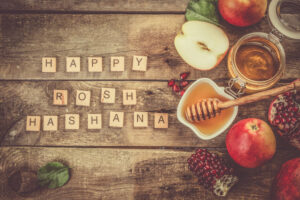
As the sweet scent of freshly baked challah drifts through the air and loved ones gather around tables adorned with honey-dipped apples, it marks the start of Rosh Hashanah. This holiday, also known as the Jewish New Year, is filled with traditions, prayers, and moments of introspection. But how was this holiday created? Let’s explore the history and customs of this meaningful celebration!
A New Year, A New Beginning
Rosh Hashanah, meaning “Head of the Year,” signifies the start of the Jewish High Holy Days. It is commemorated on Tishrei’s first and second days, the seventh month of the Hebrew calendar. The occasion is a historical reminder of the world’s creation and mankind. It’s a moment for personal reflection, where people ponder upon the previous year and strive for forgiveness, atonement, and blessings for the future.
The Shofar’s Call
Central to the Rosh Hashanah observance is the sounding of the shofar, a ram’s horn trumpet. It serves as a spiritual wake-up call, urging individuals to mend their ways and come closer to their faith. Traditionally, the shofar is blown in a series of specific patterns during morning prayer services, resonating with its deep, stirring sounds.
Sweet Symbols for a Sweet Year
Rosh Hashanah is known for its symbolic foods, which carry special meanings. For example, dipping apples in honey represents hope for a sweet year ahead. Pomegranates, with their multitude of seeds, signify the many good deeds one hopes to accomplish. Round challah loaves, sometimes sweetened with raisins, embody the cyclical nature of the year and the continuity of life.
Reflection and Renewal
During Rosh Hashanah, individuals take part in a meaningful tradition called Tashlich. This ritual involves symbolically “casting away” their sins into a body of flowing water using breadcrumbs or small pebbles. Participants reflect on their misdeeds and seek spiritual cleansing, hoping for a fresh start in the New Year.
Rosh Hashanah is a time for contemplation, gratitude, and aspiration, reminding us of life’s fragility and the importance of making each moment count. Families come together to share stories, prayers, and hopes, setting the tone for the days leading up to Yom Kippur, the Day of Atonement.
As you gather with your loved ones for Rosh Hashanah this September, consider enhancing your celebration with beautiful floral arrangements. Flowers add a touch of beauty and serenity to any gathering, symbolizing renewal and the blossoming of new possibilities.
Explore our specially curated collection of Rosh Hashanah florals at Cole’s Flowers and let the beauty of nature complement your New Year celebrations!
You can order your fresh bouquets online or call us at (802)388-4003 with any questions regarding our services.

Leave a Reply